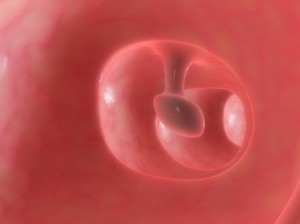Rectal Cancer
 Rectal cancer develops in the tissues of the rectum, which is the final six inches of the colon that extend to the anus. Most cases of rectal cancer begin as small, benign clusters of cells (called polyps) on the lining of the rectum. Certain types of polyps, called adenomas, can become malignant. Screening to locate and remove precancerous polyps can prevent rectal cancer from developing, so it is recommended that polyps be removed early in their growth.
Rectal cancer develops in the tissues of the rectum, which is the final six inches of the colon that extend to the anus. Most cases of rectal cancer begin as small, benign clusters of cells (called polyps) on the lining of the rectum. Certain types of polyps, called adenomas, can become malignant. Screening to locate and remove precancerous polyps can prevent rectal cancer from developing, so it is recommended that polyps be removed early in their growth.
Risk Factors for Rectal Cancer
Rectal cancer, which is more common in people older than 40, has risk factors that include the following:
- Family history of colorectal cancer
- History of polyps
- History of other cancer
Hereditary conditions that include familial adenomatous polyposis (FAP) and hereditary nonpolyposis colon cancer also put people at higher risk for rectal cancer.
Symptoms of Rectal Cancer
Initially, many people with rectal cancer are asymptomatic. As the cancer progresses, however, they may have one or more of the following symptoms:
- Change in bowel habits or stool consistency
- Rectal bleeding or blood in the stool
- Persistent abdominal discomfort, such as cramps, gas or pain
- Feeling that the bowel is not emptying completely
- Weakness or fatigue
Unexplained weight loss or a change in appetite can also be symptoms of rectal cancer.
Diagnosis of Rectal Cancer
Rectal cancer is diagnosed through a physical examination, review of symptoms, and review of the medical history of the patient and her or his family. Diagnostic tests for detecting it include the following:
- Digital rectal examination
- Barium enema
- Fecal occult blood test
- Colonoscopy
- Carcinoembryonic-antigen (CEA) assay
A sample of rectal tissue may be taken, and sent to a lab for analysis. If rectal cancer is diagnosed, X-rays, CT scans and MRI scans may be performed to determine if cancer cells have spread within the rectum or to other parts of the body.
Treatment of Rectal Cancer
Surgery is the most common form of treatment for rectal cancer at any stage of its progression. There are several types of surgery used to excise or destroy malignant tissue and a surrounding margin. For some patients, radiation therapy, chemotherapy or biological therapy are performed instead of, or in addition to, surgery.
Prevention of Rectal Cancer
There are many steps that can be taken to lower the risk of developing rectal cancer. Following a healthful low-fat diet that is high in fiber and antioxidants, drinking alcohol in moderation, exercising, maintaining a healthy weight, and refraining from smoking all decrease the chances of developing it. Regular colonoscopies are recommended for those who meet the following criteria:
- Are older than 50
- Are African-American and older than 45
- Are at high-risk for rectal cancer
Colonoscopies are important because they can detect prostate cancer in its early stages, and remove suspicious rectal polyps before they become malignant.
